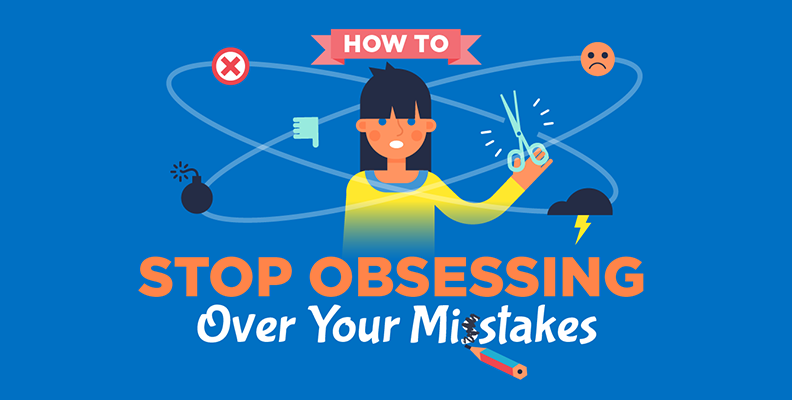Worrying is natural. In fact, worry is an evolutionary tendency, since learning from your mistakes helps you not make them again. It’s how children learn not to touch hot things – and how our ancestors learned not to pet the crocodiles! But when contemplating or worrying about your mistakes becomes an obsession, it stops being a survival tool and can actually become harmful.
Part of the problem is that our brains tend to use ‘down time’ to process those mistakes. When your mind has nothing else to do, it reflects on the past, and particularly on those moments from which you’ll benefit from learning. But your body is a complex system. People whose minds tend to circle around the same mistake again and again are at higher risk of eating disorders, depression and heart disease.
One way to jolt yourself out of this mindset is to give your mind something else to do. Get a change of scenery, or at least a change of ‘mental scenery.’ Going for a walk, having a chat or getting stuck in a new task can all help dispel that inner voice.
But sometimes the obsession lasts longer than a few quiet minutes. Sometimes it just feels impossible to let go. In this case, a more focused attempt to resolve the underlying issue can help. Try writing down a step-by-step plan to fix your mistake, avoid making it in the future or to proceed with your next project.
And work on your general response to mistakes by learning to be gentler with your mind: try doing self-esteem-building exercises, and switch the phrases you use from things like “I‘m a failure” to “I failed, but I can learn from this.”
We’ve created a new visual resource to help you to leave your mistakes in the past, to learn and move on – and avoid falling into the same obsessional trap again. Different solutions will work with different instances of regret, so if one method isn’t working then try the next.
Worrying about your mistakes is only useful for a small period of time. It soon becomes a problem of its own, harming you and preventing you from moving on. To err is human, but to learn how to use those errors productively is divine.

Sources
- Raichle. M.E, MacLeod. A.M, Z. Snyder, A. Powers. W.J, Gusnard. D.A, Shulman. G.L. (2001). A default mode of brain function. pnas.org
- Baumeister. R.F, Bratslavsky. E, Finkenauer. C, Vohs. K.D. (2001). Bad Is Stronger Than Good. umn.edu
- Syrek, C.J, Weigelt, O, Peifer, C, Antoni, C.H. (2017). Zeigarnik’s sleepless nights: How unfinished tasks at the end of the week impair employee sleep on the weekend through rumination. ncbi.nlm.nih.gov
- Caselli. G, Ferretti. C, Leoni. M, Rebecchi. D, Rovetto. F, Spada. M.M. (2010). Rumination as a predictor of drinking behaviour in alcohol abusers: a prospective study. onlinelibrary.wiley.com
- Suhr. K.A, Dula. C.S. (2018). The dangers of rumination on the road: Predictors of risky driving. sciencedirect.com
- O’Connor. R.C, Noyce. N. (2008). Personality and cognitive processes: Self-criticism and different types of rumination as predictors of suicidal ideation. sciencedirect.com
- Dondzilo. L, Rieger. E, Palermo. R, Byrne. S, Bell. J. (2016). Association between rumination factors and eating disorder behaviours in young women. researchgate.net
8.Lyubomirsky. S, Kasri. F, Chang. O, Chung. I. (2007). Ruminative Response Styles and Delay of Seeking Diagnosis for Breast Cancer Symptoms guilfordjournals.com
- Busch L.Y, Pössel.P, Valentine J.C. (2017). Meta-analyses of cardiovascular reactivity to rumination: A possible mechanism linking depression and hostility to cardiovascular disease. ncbi.nlm.nih.gov
- University of Liverpool. (2019). Dwelling on negative events biggest cause of stress. liverpool.ac.uk
- Selby. E. (2010). Rumination: Problem Solving Gone Wrong. psychologytoday.com
12.Powers, T.A, Koestner, R, Zuroff, D.C. (2007). Self-Criticism and Goal Progress. selfdeterminationtheory.org
13.McRae,K, Hughes,B, Chopra,S, Gabrieli, J.D.E, Gross,J.J, Ochsner, K.N. (2014). The Neural Bases of Distraction and Reappraisal. ncbi.nlm.nih.gov
- kIngs College Hospital.(2019). Breathlessness and anxiety. kcl.ac.uk
15.Masicampo, E. J, Baumeister, R.F. (2011). Consider It Done! Plan Making Can Eliminate the Cognitive Effects of Unfulfilled Goals..wfu.edu
- Dunbar, R.I.M, Marriott, A, Duncan, N.D.C. (1997). Human Conversational Behaviour. medisch-fitness.com
- Varma, B.N. (2015). Complaining, for Your Health. theatlantic.com
Embed This Image On Your Site (copy code below):






